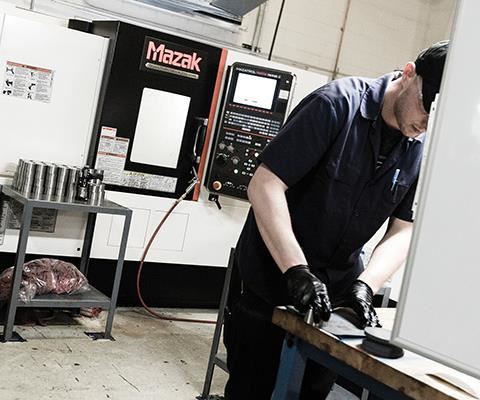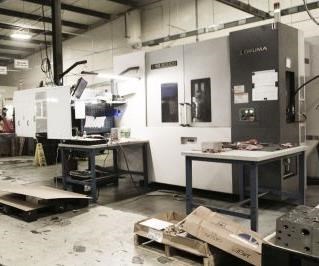Anderson Machining Finds Its Unicorn
For this formerly family-owned shop, the generational transition and the shop’s future prospects were both better served by letting a new owner take the business bigger. The family was happy to discover that an owner like this does exist.
Share




Takumi USA
Featured Content
View More


ECi Software Solutions, Inc.
Featured Content
View MoreThe phrase “mom and pop shop” describes a type of business the readers of this magazine know well—the independent, family-owned machining contractor. Increasingly, that same phrase also points to a challenge these shops are facing. As the time comes for the current owners to retire, can these owners—often literally Mom and Pop—be taken care of? That is, can the business provide for the transition and provide a comfortable retirement for these people while its own success and profitability continue uninterrupted? Shops still carrying the effects of the 2008-2009 collapse (even if they are thriving today) might not be in a financial position strong enough for this.
Anderson Machining Service was an example. Ron and Sue Anderson founded the Wisconsin machine shop in 1980. Sons Erik and Kyle joined the business in its early years and have worked there ever since. Today, that business employs more than 160 between two plants 15 miles apart, and starting this year, that business began going by a different name: Basin Precision Machining. The formerly independent shop is now part of a much larger family of companies, and Erik Anderson enjoys a far different role than he could have imagined for himself even a year ago. He says he and his brother both agreed to the shop’s acquisition by Basin Industries and both happily became part of the Basin organization, because these changes enabled them to fulfill what had become one of their primary goals for the shop. That goal was “to do right by Mom and Dad,” Mr. Anderson says.
Not incidentally, the way forward that they found has also opened new possibilities for the business and for the team members who are a part of it. This aspect of the acquisition is proving to be an equally important part of this latest chapter in the shop’s story.
That chapter began last year. Mr. Anderson says the challenge of how to give his parents a graceful and carefree exit occupied the brothers’ attention (and their parents’ attention) throughout 2015. The obstacle to the direct generational transition from the parents to these brothers could be summarized in one word: debt. After the collapse, he says, “we got through like other shops did, by chopping and cutting.” But when business finally increased in 2011, it increased dramatically. The shop had to expand rapidly to take on the work then coming to it. Fortunately, the company had the credit for this expansion, but the resulting debt ultimately added so much to the current costs of the business that it precluded the brothers from buying out their parents at a price that might have made for an easy retirement.
So they began searching for a third-party buyer instead. And that search was dispiriting, Mr. Anderson says. One conversation after another was disappointing. Private equity firms offered no acceptable solution, because these firms generally aim to profit from their investment across a short horizon of years. This meant these firms offered far less for the shop than the family hoped to obtain. It also meant the prospects for the shop’s employees would not be good, because a new owner such as this would be more apt to trim the shop’s costs rather than grow the shop’s business. Instead of an owner with a short time horizon, the family wanted to find a buyer that saw long-term value in the shop and was willing to pay for that value. A trusted financial advisor said, “I think you’re looking for a unicorn.” But the Andersons finally found that unicorn seven months into the search when they met Jim Waters, vice chairman of Basin Industries.
For starters, Basin understood the peril and compromises that come from sharp market declines. This company’s core business is equipment supply to the oilfield sector—a volatile market to say the least. Seeking to diversify against that volatility was the very reason Basin was having this conversation. The company had established Basin Material Handling to supply component racks to manufacturing facilities (a product with more stable demand) and now it wanted to launch Basin Precision Machining. This newer group would specialize in machining hydraulic system parts for heavy equipment makers. The Anderson shop would be the first acquisition into this group.
Mr. Waters heads the group. Previous to Basin, he worked 32 years at Caterpillar. Mr. Anderson describes the initial meeting with him as “love at first sight.” At one point in this meeting, when Mr. Waters spoke at length about the value and importance of American manufacturing, Mr. Anderson looked at his wife and noticed she was smiling. When pressed, she explained that Mr. Waters had just given a speech that her husband could also have given verbatim. The deal between the two companies was signed soon after.
For Mr. Anderson, what came next was to let go of his expectation of being a family owner of an independent shop and to step into the very different role being offered to him as part of Basin’s director team. As the elder brother and the one who had been expected to become the president of the shop, it was important for him to step out of the way, he says. (His brother remains in something much like his previous leadership role as chief of technology and engineering.) In order to reorganize the company for growth, the Basin group is bringing changes to the shop that include cultural shifts. In particular, the new owner is implementing a Basin Production System (modeled after the Toyota Production System) that brings more influence to the former Anderson employees by conveying production metrics to them and engaging them in continuous improvement efforts. Meanwhile, Mr. Anderson is indeed the president of Basin Precision Machining today, but his role is aimed outward rather than inward. He is focused on seeking and evaluating other shops that might join this business unit, with the aim of growing it from its current $30 million in sales to $200 million in five years. A new operations manager leads the changes and oversees the day-to-day work in the former Anderson facilities. Mr. Anderson knows he can best help this manager by not intruding, so he says, “I now stay off the shop floor.”
The elder Mr. and Mrs. Anderson officially began their retirement this year. The shop has changed significantly even in the short time they have been gone, and their son believes it has changed for the better. Though the family members did well with the business throughout the years they oversaw it, it is possible they took the business as far as they could, he says. What is clear to him now is the extent to which the possibilities for a mom and pop shop are limited, even when a capable and dedicated mom and pop are at the helm. The scale of the organization that now owns this shop has quickly opened up a broader horizon of possibilities.
The new operations manager is an example of this, Mr. Anderson says. The recent hire is a manufacturing leader who is credentialed to the extent that he probably would never have been drawn to a mid-size independent shop. However, he does want to be part of the much larger manufacturing enterprise he is now helping to build.
Another visible example of the kind of change that the larger organization makes possible is this: 14 new machine tools that were all added within a six-week window of time this year. The impetus for this unexpected investment was the shop’s largest customer facing an emergency after the failure of one of its suppliers. In the past, such a huge opportunity would have been too big for Anderson Machining Service. Slower expansion than this resulted in the debt that ultimately changed the company. But this opportunity was not at all too big for Basin, which committed capital and personnel to rising to the challenge. In the rapid expansion that followed, and in the determined response to the needs of the market, the company illustrated how it will now continue to grow moving forward.
Read Next
5 Rules of Thumb for Buying CNC Machine Tools
Use these tips to carefully plan your machine tool purchases and to avoid regretting your decision later.
Read MoreBuilding Out a Foundation for Student Machinists
Autodesk and Haas have teamed up to produce an introductory course for students that covers the basics of CAD, CAM and CNC while providing them with a portfolio part.
Read MoreRegistration Now Open for the Precision Machining Technology Show (PMTS) 2025
The precision machining industry’s premier event returns to Cleveland, OH, April 1-3.
Read More

















.png;maxWidth=150)






























